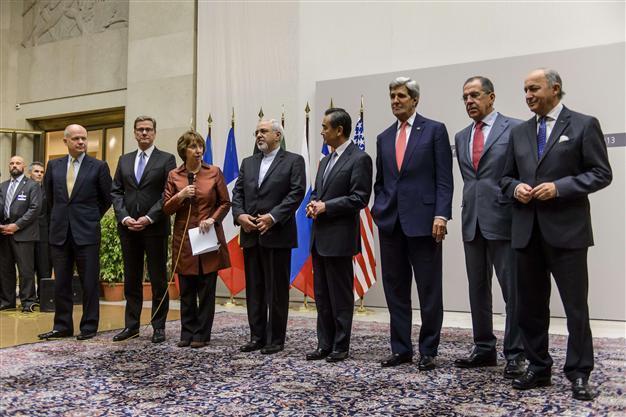Turkey welcomes nuke deal, repeats its readiness to endorse it
ISTANBUL

British Foreign Secretary William Hague, German Foreign Minister Guido Westerwelle, EU foreign policy chief Catherine Ashton, Iranian Foreign Minister Mohammad Javad Zarif, Chinese Foreign Minister Wang Yi, US Secretary of State John Kerry, Russian Foreign Minister Sergei Lavrov and French Foreign Minister Laurent Fabius attend a statement on early November 24, 2013 in Geneva. AFP Photo
Turkey has welcomed the deal reached between P5+1 countries and Iran over the latter’s nuclear program and reiterated its endorsement of the process, recalling its earlier efforts for a diplomatic solution to the question.
“I welcome today’s agreement on Iran’s nuclear program. I have been advocating a solution through diplomacy and we hosted many diplomatic efforts in Turkey to this end,” Turkish President Abdullah Gül said through his twitter account on Nov. 24. “This is a major step forward. I hope it’ll be sealed with a final agreement soon. I congratulate all parties for their constructive engagement.”
The Foreign Ministry also welcomed the deal and congratulated Iran and P5+1 countries, recalling that the deal reached in Geneva was the first concrete development with regard to the nuclear problem since the Tehran Declaration initiated by Turkish and Brazilian mediation in 2010. “By all means, the said deal constitutes the very beginning of the process and short-term confidence building measures,” it read.
Efforts carried out in 2010 by Turkey and Brazil for a diplomatic solution remained futile as the United States did not endorse the move although it earlier gave a green light to both countries to initiate what they called “the swap deal.”
Ankara called on parties to carry on their constructive approaches to move the process forward with hopes that this issue will be fully resolved diplomatically in a way to satisfy relevant parties. “Turkey, which made every effort to keep the diplomatic process alive for the solution of the problem, is ready to provide every kind of support,” it stressed.
The ministry repeated that Turkey would continue to defend countries’ rights to peaceful use of nuclear energy on the condition of full compliance with the Non-Proliferation of Nuclear Weapons Treaty (NPT) and to endorse endeavors to clear the Middle East of all kinds of weapons of mass destruction.
HH Easing sanctions to Turkey’s advantage
In a statement hours before the deal was reached, Turkey’s Foreign Minister Ahmet Davutoğlu said it was Turkey who wanted the deal more than any other country. “This deal would help defuse the tension in our region and establish a new workforce in the international arena,” he added.
Turkey’s economic relations with Iran have suffered due to sanctions imposed on its oil-rich neighbor. With the easing of these sanctions, Ankara believes the two countries could increase the trade volume and pave the way for fresh energy projects.
Davutoğlu to go to IranIn the meantime, Davutoğlu will travel to Tehran tomorrow to attend the Economic Cooperation Organization, set for Nov. 26 and 27. Davutoğlu is expected to meet with his Iranian counterpart Javad Zarif on the sidelines of the meeting.
